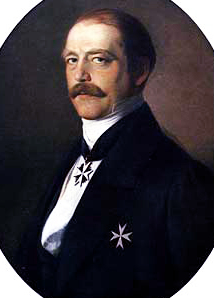Royal_Prussian_Order_of_Saint_John
The Royal Prussian Order of Saint John (German: Königlich Preußische St. Johanniter-Orden) was an order of merit in the Kingdom of Prussia.[1] It was set up in 1812 and was awarded until the inauguration of the modern Order of Saint John in 1852.
This article needs additional citations for verification. (March 2020) |
You can help expand this article with text translated from the corresponding article in German. (June 2019) Click [show] for important translation instructions.
|
